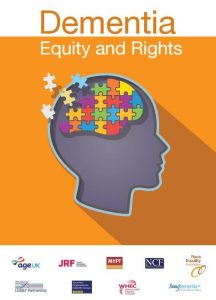In this latest blog I want to highlight a new report from the Strategic Partners Programme for dementia, called ‘Dementia: equity and rights.’ The report seeks to demonstrate why there is no ‘one size fits all’ approach to dementia care and how this reality must influence our service commissioning and design, workforce development and care planning.

Earlier this year, the Department of Health set out actions Government and a range of partners intend to take to make England world-leading in dementia care, research and awareness by 2020.
These actions have been developed from the position that dementia is not a person’s defining characteristic. It is never ‘who they are’; rather it is a disease. How that disease affects each person is influenced by many factors including age, ethnicity, gender, sexual orientation, disability, mental or cognitive conditions, as well as wider cultural and community contexts.
With this awareness comes the need to understand and uphold the rights of a wide range of individuals who, whilst having dementia diagnoses in common, have personal experiences and backgrounds which can affect their level of risk and should influence the treatment and support they receive. There are also issues around how they, their family and carers access and respond to services – and how those services respond to them.
The publication of ‘Dementia: equity and rights’ is timely as it pulls together research and analysis across a range of demographies whose relative minority status can lead them to ‘feel left out or misunderstood within systems created for the generic population’. It also invites its audience to be more keenly aware of how unrelated disabilities can mask or delay diagnosis and support amongst these groups. At its heart, this report is the expression of a desire to end inequality and promote respect for the individual, underpinned by the sharing of best practice.
For example, an increase in the number of older people from black African, Caribbean, South and East Asian minority ethnic groups in the UK will lead to an increased need for dementia services culturally sensitive to these groups. Dementia services such as Bradford’s Meri Yaadain, serving the city’s South and East Asian population, and the Chinese National Healthy Living Centre in north London are leading the way, but we need to capitalise on their example as our ethnic populations continue to diversify and age.
In a related community context, I would recommend that commissioners and service providers read the section of the report focusing on socio-economic status and its relationship to dementia prevalence. Sadly, as you’d expect, the risk of developing the condition and the percentage of related hospital admissions seem highest in the most economically deprived areas.
I was particularly pleased to see the impact on carers highlighted throughout this report. It reaffirms the fact that ‘many carers face financial hardship as a result of reduced income and additional outgoings…Carers Trust describe particular problems in relation to Power of Attorney [and] the financial abuse of people with dementia.’
To address these and other issues, MindCare, the dementia arm of Bromley and Lewisham Mind, operates a free information and advice service for carers. In a borough with high levels of deprivation, their accessibility and flexibility to work around carers’ schedules is vital in preventing those with ‘limited financial resources [from] reaching crisis point.
On a related point, our Carers Strategy call for evidence, hopes to shine further light – and eventual mitigation - on this topic. If you have an interest or experience relating to carers and the particular challenges caring for someone with dementia can bring, then please do contribute. I should also mention that the Dementia 2020 Implementation Plan made a commitment to establishing a Citizens’ Panel to promote engagement with people with dementia and their carers.
Finally, I’d like to draw attention to the work this report has done in relation to lesbian, gay, bisexual, and transgender (LGB&T) dementia care and support. The observation is made that ‘older LGB&T people are more likely to live on their own and be single’, so community and care service outreach is clearly important. As for those unable to remain at home, here’s a telling quote:
“People ‘disappear’ in residential care – their identity ceases to exist – not many people are ‘out’.”
This observation is borne partly out of stigma but also the cultural experiences that shaped the early lives of older gay men and lesbians. Dementia further complicates and sensitises the way individuals cope and also how care workers – and services – interact with them. On this point, the report recommends that Health and Wellbeing Boards work closely with CCGs to recognise the needs of LGB&T people and that assessments explicitly consider how care and support can be shaped around the needs of this community.
Overall, this report should be applauded for its comprehensive and nuanced approach to dementia – a condition as wide ranging as the people it affects. It has provided me with much food for thought. More importantly, I hope it leads to more people and those who care for them receiving – not just the personalised support – but the understanding and respect they deserve.

3 comments
Comment by Tim Leung posted on
Examples of good home care models and community support models are not only needed to be "capitalised" as stated in the blog; but also adequately funded to ensure such good care continues to deliver. Early detection and prevention are vital not only to the individuals and families concerned but it can also diect valuable resources to the right place. In the long run this will not only save resources but also extend the healthy living of individuals, families and communities.
Comment by Margaret Parker posted on
Thank you for your advice and understanding.. I find it very helpful.. A nonagenerian
Comment by Mary Tilki posted on
It is a real pity and arguably discriminatory that the Irish, the largest and oldest minority ethnic community have been excluded from the ethnicity chapter in this document. Truswell estimates that there are over 10,000 Irish born people with dementia in England, and the "Dementia does not discriminate" report highlights the plight of older Irish people with dementia and their carers. Irish people with dementia have increasing rates of dementia and their cultural needs are widely neglected by commissioners and providers.
Although the table on page 26 excludes the Irish, the research from which this is adapted, does include them and notes the older age profile of the Irish which is significantly greater than other populations mentioned. While age is the main risk for dementia, high rates of cardiovascular disease,LLTI and depression are additional factors which may even expand Truswell's estimate. Like other communities we have gender, sexuality, disability and socio-economic issues and Irish Travellers who have the lowest life expectancy appear to have increasing rates of dementia. I am happy to provide Jon Rouse with further evidence.
This report which espouses equity, equality and rights neglects a large community who have contributed so much to British society..